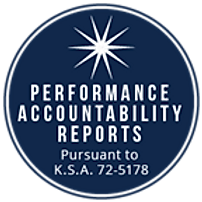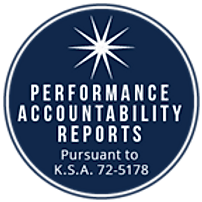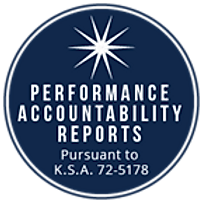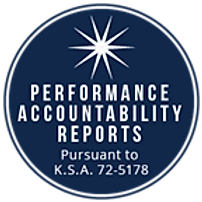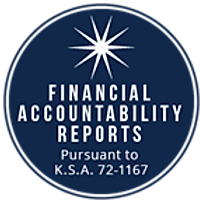Federal Programs
Title I
Title I Part A of the Elementary and Secondary Education Act is a federally funded program which provides supplemental support to students in high poverty schools.
The purpose of Title I is to ensure that all children have a fair, equal and significant opportunity to obtain a high-quality education and reach, at a minimum, proficiency on challenging State academic standards.
Federal Regulations
In accordance with K.S.A. 72-5178 and 72-1167, on or before January 15 of each year, the Kansas State Department of Education is required to prepare and prominently display on its website performance and finance accountability reports for each school district and each school operated by a school district. Additionally, the accountability reports prepared for each school district and each school operated by that district must be published on the district's and schools’ websites with a link to the reports prominently displayed on each website’s homepage titled, "Accountability Reports."
Accountability Reports
Parental Notice
The district's comprehensive assessment system is comprised of a variety of assessments with a range of purpose. Students enter the classroom with diverse backgrounds and skills; assessments help teachers understand students' academic needs. Assessment results are used to help teachers with instruction by identifying skills that are mastered and skills needing review. Assessments are also used to determine the effectiveness of instruction so teachers know how to make adjustments to better support students' learning.
Universal Screening is a critical first step in identifying students who may be at risk for experiencing reading, math or social-emotional related difficulties and might need additional supports. Screeners are a first look at who might need further academic diagnostics or social-emotional supports. The universal screeners the district uses are FastBridge (academic foundational reading and math skills), and the SAEBRS screener (social, academic, and emotional skills). Benchmark screening for academics takes place 3 times throughout the school year. SAEBRS student self-ratings occur at the beginning and middle of the school year in August and February.
Screening data provides valuable information to help your child's teacher(s) target areas in which your child may need support to improve. This data is critical so that teachers can make sure your child is making the progress expected in their grade-level academics and their social and emotional skills. When children's social and emotional health is compromised, it can create significant challenges for children leading to failure in school, an inability to make and sustain friendships, and negative feelings about themselves. Please ask your child's teacher or principal if you have any questions about screenings.
Diagnostics follow screening for only the students needing specific skill support identification. Diagnostic tests are only given when there is a clear expectation that the assessment will provide new or more in-depth information. The diagnostics used to identify literacy skills are the Quick Phonics Screener (QPS) and the Phonological Awareness Skills Test (PAST). Depending upon the need, one or the other reading diagnostic is used to determine specific reading skills needing targeted instruction.
Predictive Interim Assessments are taken three times prior to state assessments. These reading and math assessments mirror content and formatting students encounter on the state assessment, making students and teachers aware of the complexity of the state assessment and a glimpse into how students are performing prior to the state assessments. Beyond state assessments, the Predictive Interim data is helpful to teachers to understand how to adjust their instruction to help students meet the complexity of their grade level standards.
State Assessments in reading and math are given online each spring in grades 3 through 8 and 10. Students in grades 5, 8 and 11 also take science assessments each year. The reading, math, and science state assessments are taken over a period of 3-4 weeks. See the assessment schedule or assessment calendar for specific date ranges.
The 2021-22 school year will mark the beginning of the new history government social studies assessment for students in grades 4, 7 and 11. The will use the Document Based Questions process as it occurs in the assessed grades' scope and sequence that is already in place to meet the state's history government social studies requirements.
Student performance on state assessments is measured according to four performance levels.The Kansas state assessment will remain consistent through 2025. Click the link here to view or download the grade level assessment development guides.. State assessment performance may be viewed at Kansas Report Card. Students in tested grades will participate in predictive interim assessments prior to the state assessment to gauge areas teachers may need to revisit to ensure students are able to master their grade level objectives.
The Kansas State Department of Education expects all eligible students to participate in state assessments (including DLM and KELPA); however, it is also recognized that parents have the right to opt their student(s) out of state assessments. We will respect parent/guardian wishes in this regard. If you believe this is the best decision for your child, please visit with your child's school principal regarding your wishes for the current academic year. Schools should immediately notify Assessment and Research when a parent requests their child(ren) be opted out of state assessments (KAP, DLM or KELPA). Parents may provide notification to the school via email, phone, in person.
College and Career exploration and preparation is an ongoing process that develops as students progress through their academic career. The district uses tools and assessments from Xello that work together to help students make educational and career planning decisions in grades 6 thru 12. For more information contact the Career and Technical Education office or your high school's College and Career Coordinator.
At no cost to families, the Kansas Department of Education makes the Pre-ACT (grade 9), the ACT (grade 11) college entrance exam and the WorkKeys (grade 12) work place skills assessment available to all Juniors each February. It is expected that all Juniors participate in the ACT exam unless a parent has contacted the school to opt them out of the exam.
The Preliminary Scholastic Aptitude Test (PSAT) is a predictive assessment of a student's strengths and weaknesses when considering post-secondary options. The PSAT is a National Merit Scholarship qualifying test that is administered to registered 10th and 11th grade students in mid-October. One this same date, 9th grade students participate in the Pre-ACT, provided by the Kansas State Department of Education, at no cost to families.
For more information on preparing for post-secondary options, visit College Board.
To see post-secondary technical education partnership opportunities offered in Kansas visit the Kansas Department of Education (KSDE).
McKinney-Vento Homelessness
The McKinney-Vento Homeless Assistance Act requires that all schools provide students in transition with immediate access to an education, even if the child lacks school records, a birth certificate, medical/immunizations documents, or proof of residency. The Wichita Public Schools has a strong commitment to ensure that all homeless children and youth receive a meaningful opportunity to enroll and attend all public schools in the district. The Wichita Public Schools McKinney-Vento Office acts as a resource for homeless families and school personnel facing questions or assistance related to homeless children and youth so they can overcome obstacles and barriers.
McKinney-Vento Services
The McKinney-Vento Program provides services for families to help overcome the obstacles and barriers so that their children and youth can be successful in school. If you or you know of anyone who is temporarily living in any of the following situations due to economic hardship, eviction or loss of housing, they may qualify for our services. These families do not have a regular night time residence of their own.
Families are temporarily:
doubled up living with a friend or relative
staying in a motel or hotel
living in an emergency, transitional or domestic violence shelter
living in a car, public place, abandoned building or campground
Unaccompanied youth without parent or guardian support and who do not have a home may also qualify for the program.
Your children have the right to:
Attend school without any documentation. They must be given access to the same public education provided to other students, including pre-school children.
Continue in their school of origin before they became homeless or their school of residence. If a school sends your child to a school other than the one you request, contact the McKinney-Vento office for assistance.
Enroll in school without giving a permanent address. Schools cannot require proof of residency that might prevent or delay school enrollment if you qualify for the McKinney-Vento program.
Receive transportation to school if they qualify for McKinney-Vento. Student must live 2.5 miles away. A transportation request must be made through the McKinney-Vento Office.
Attend school and participate in school programs with children who are not homeless. Children cannot be separated from the regular school program because they are homeless.
Receive comparable services provided to other USD 336 students.

